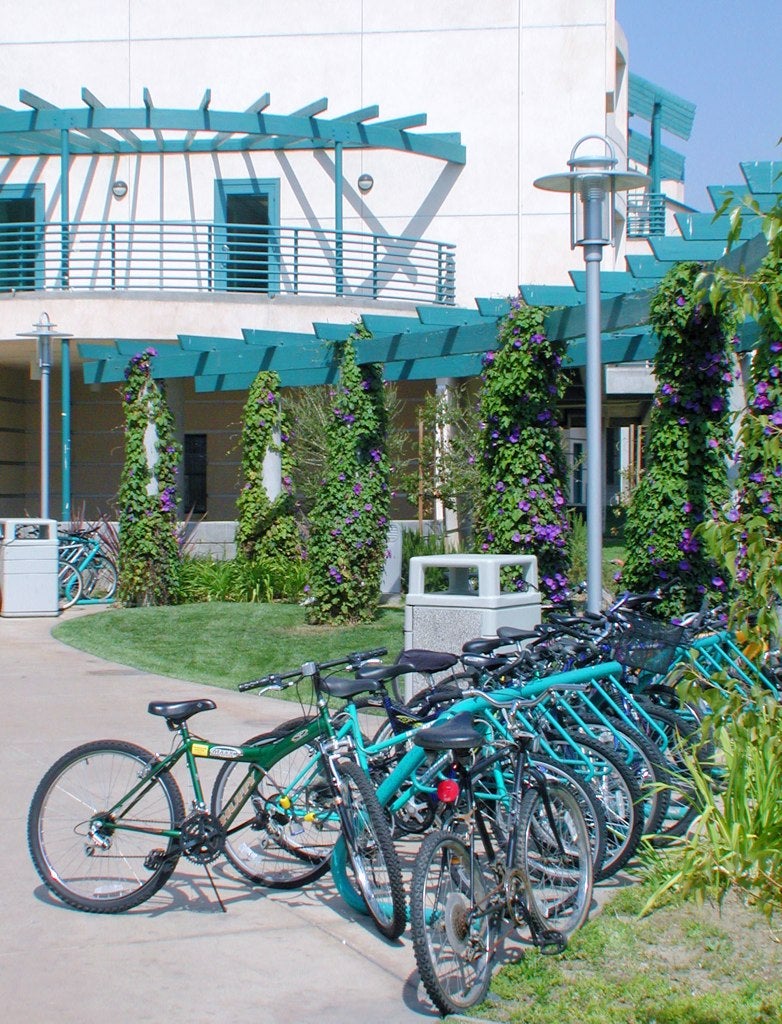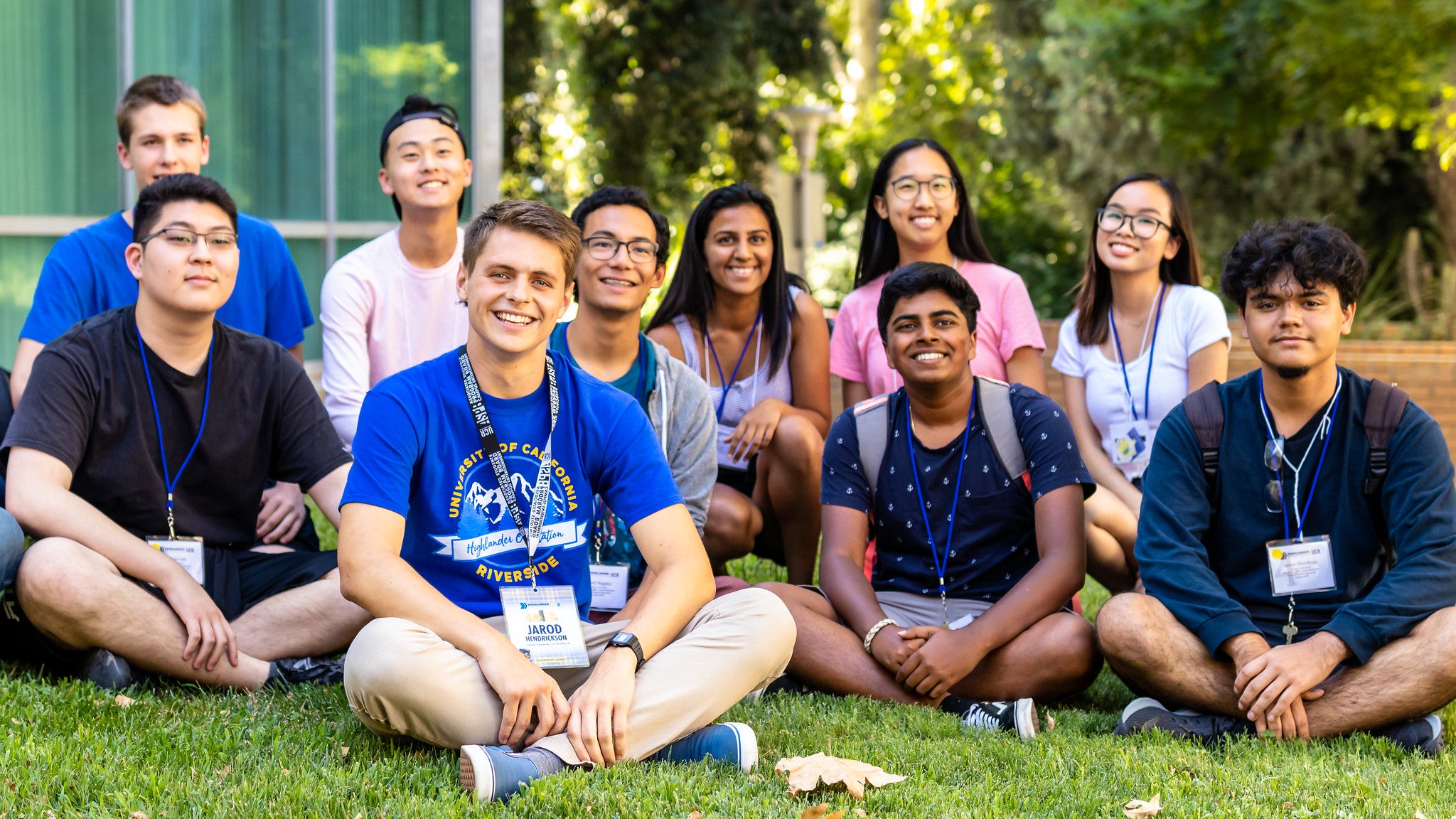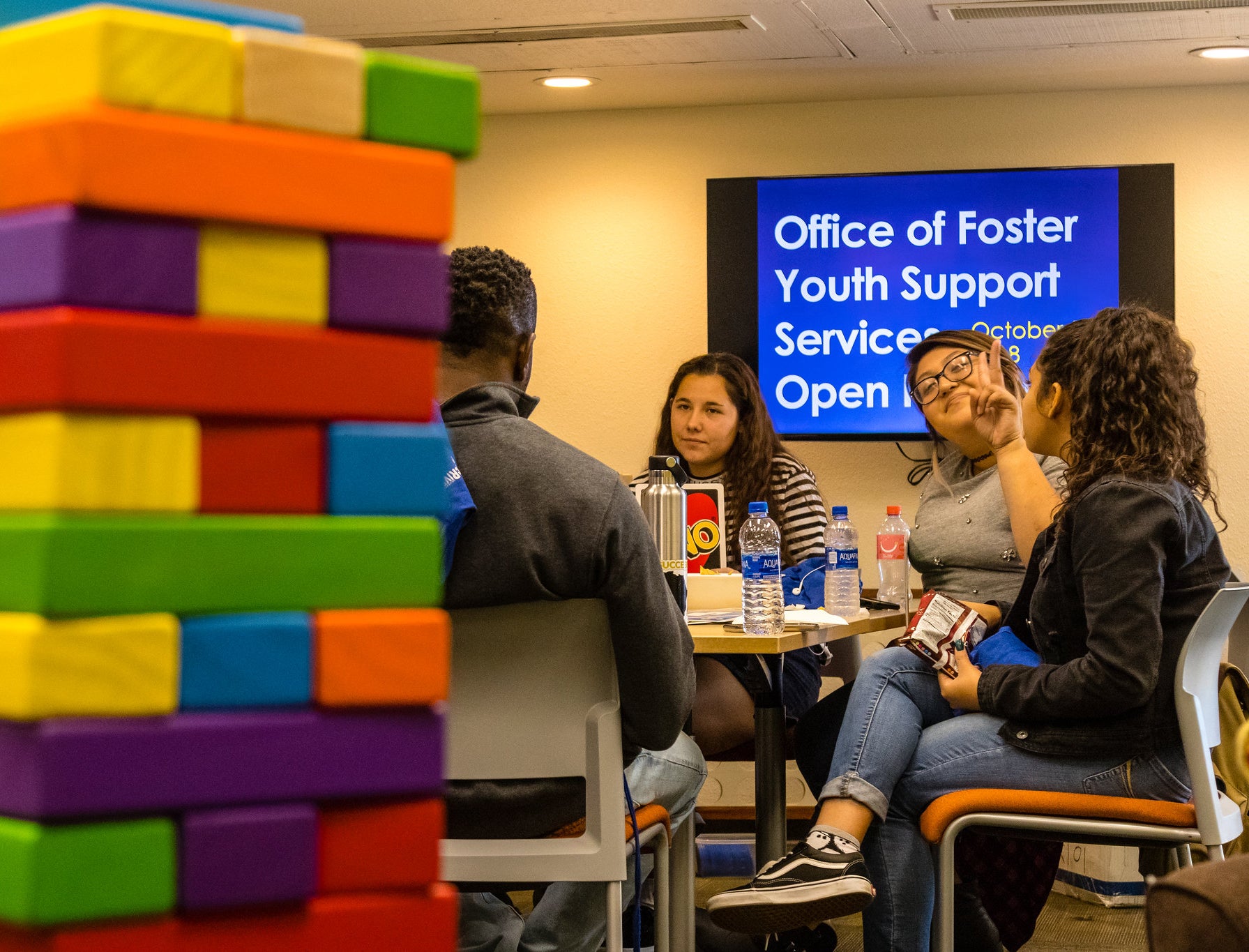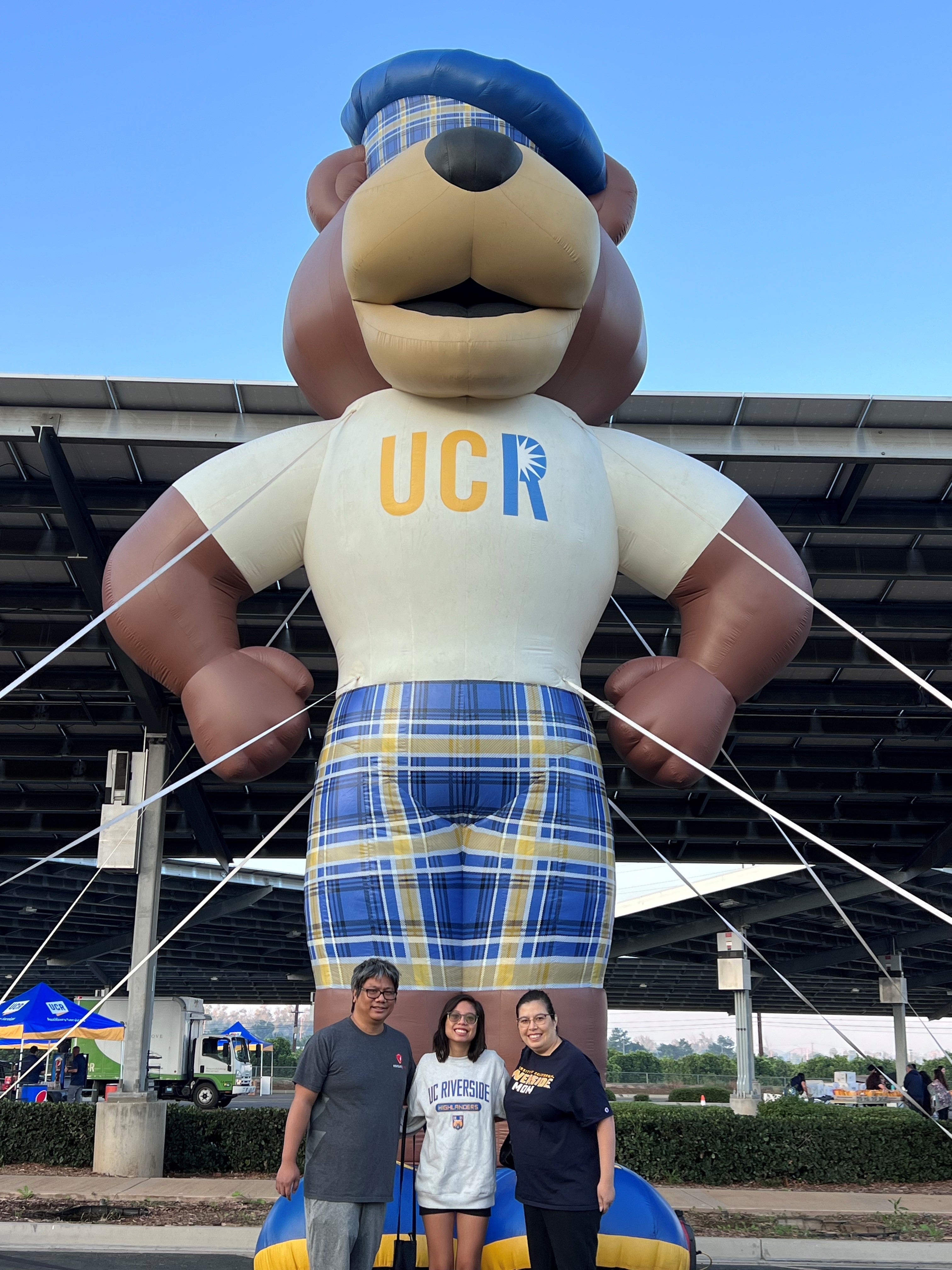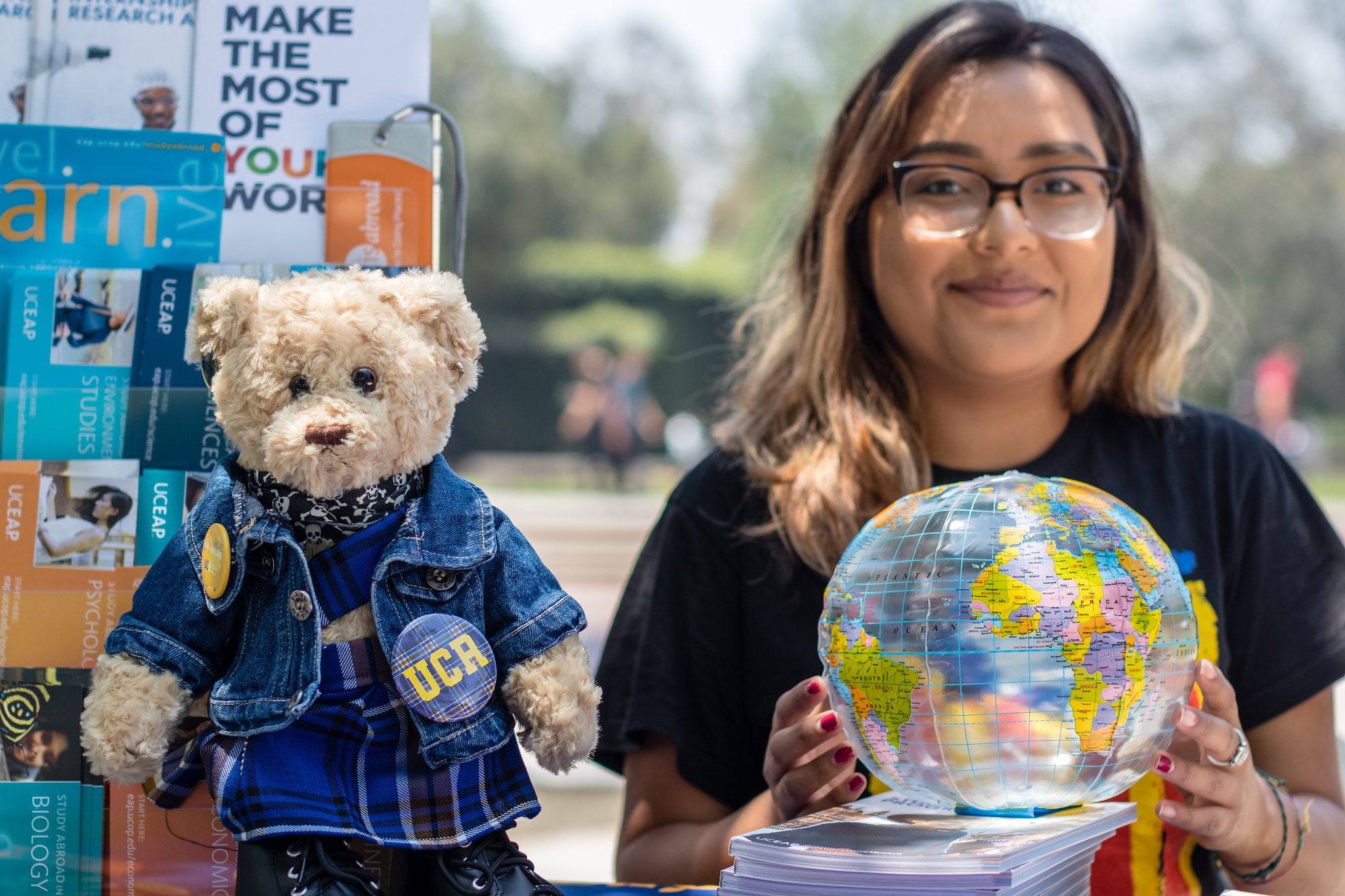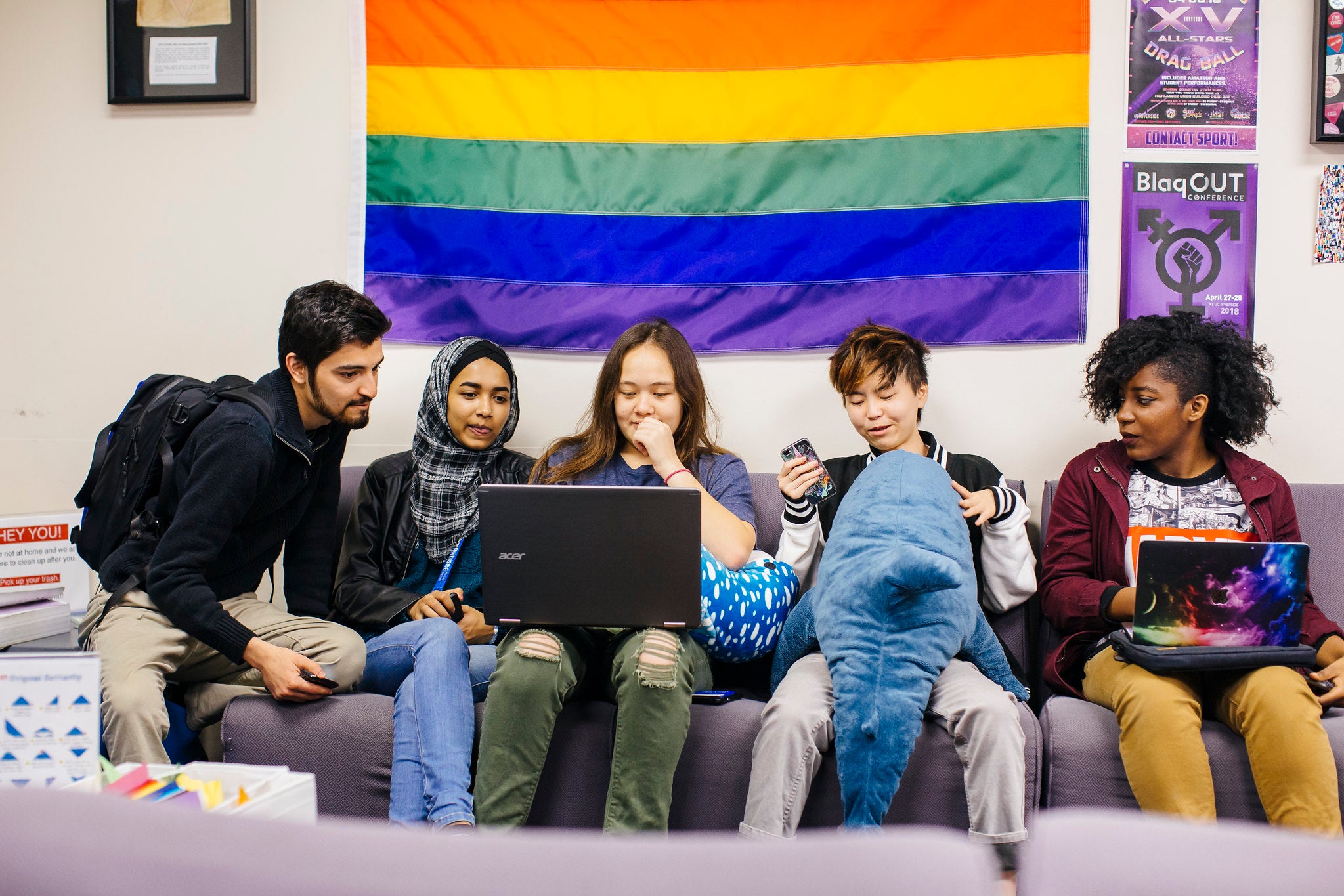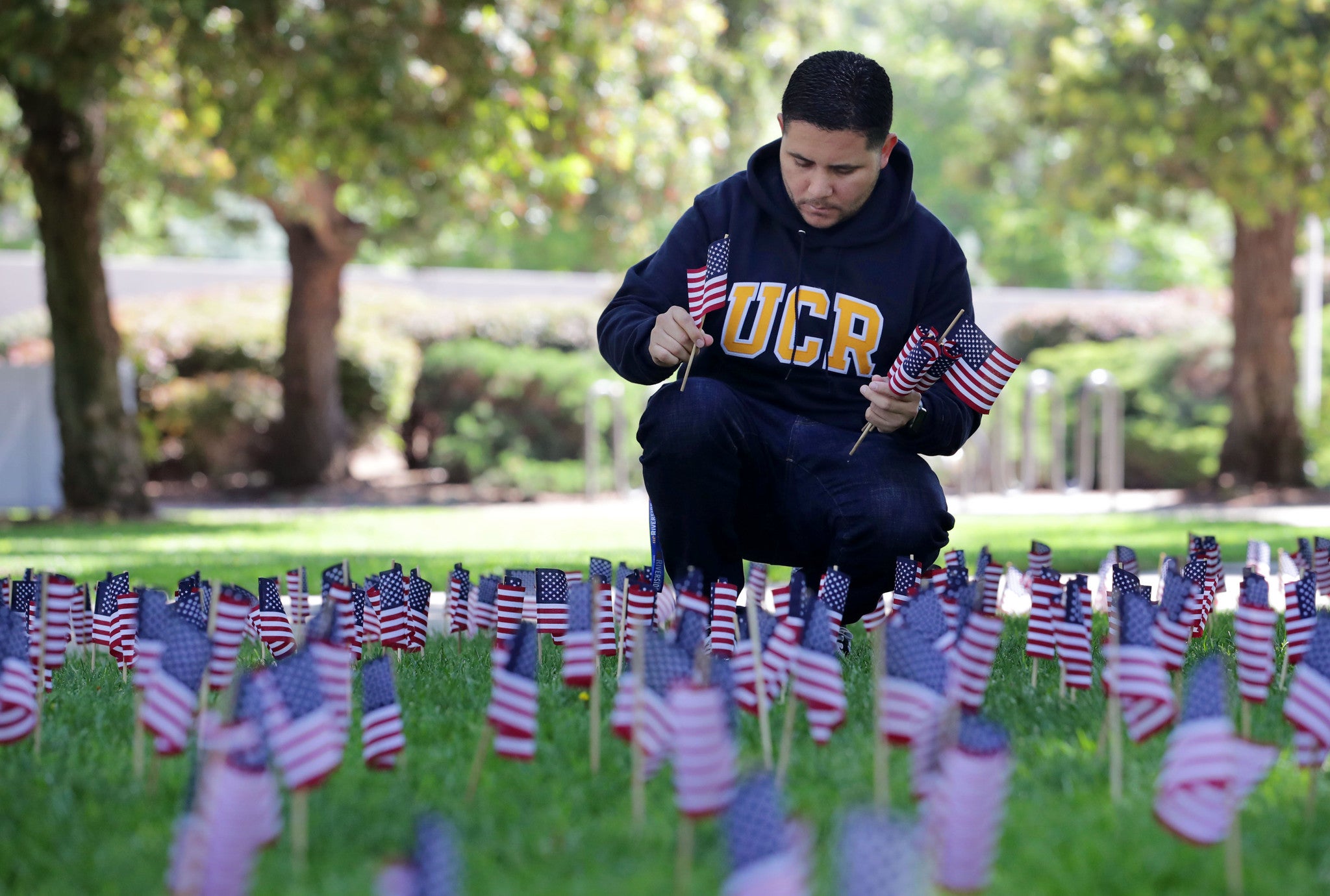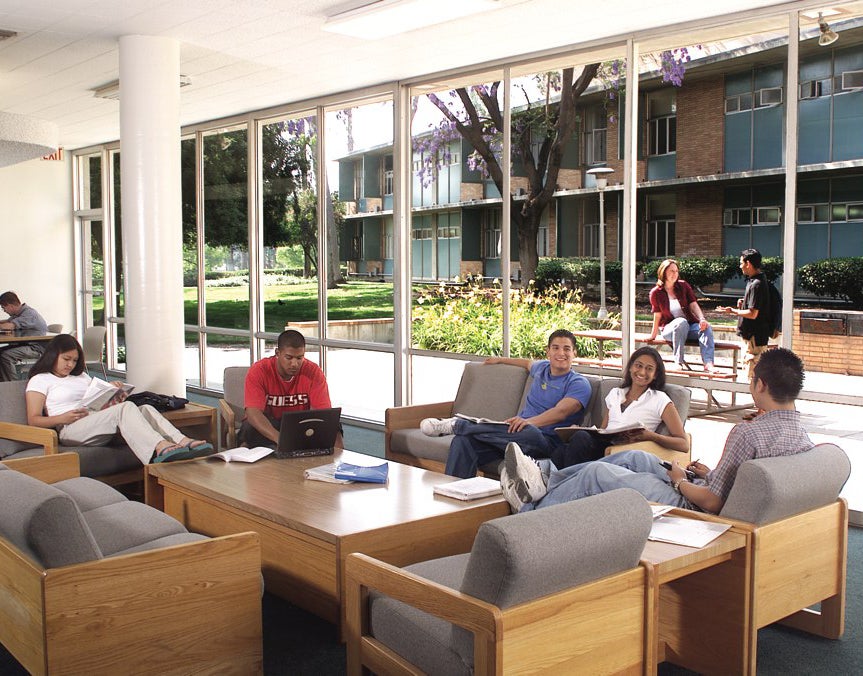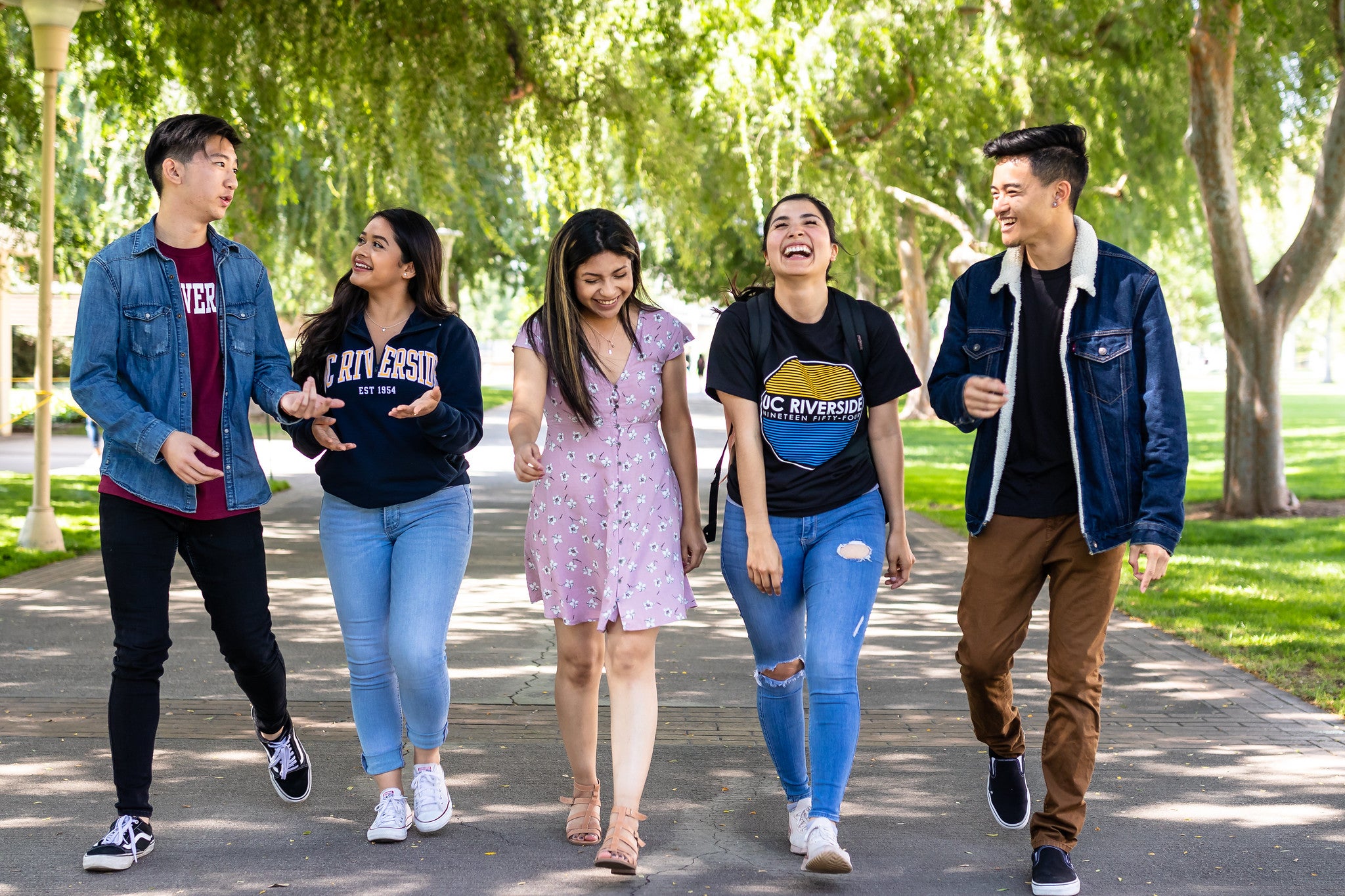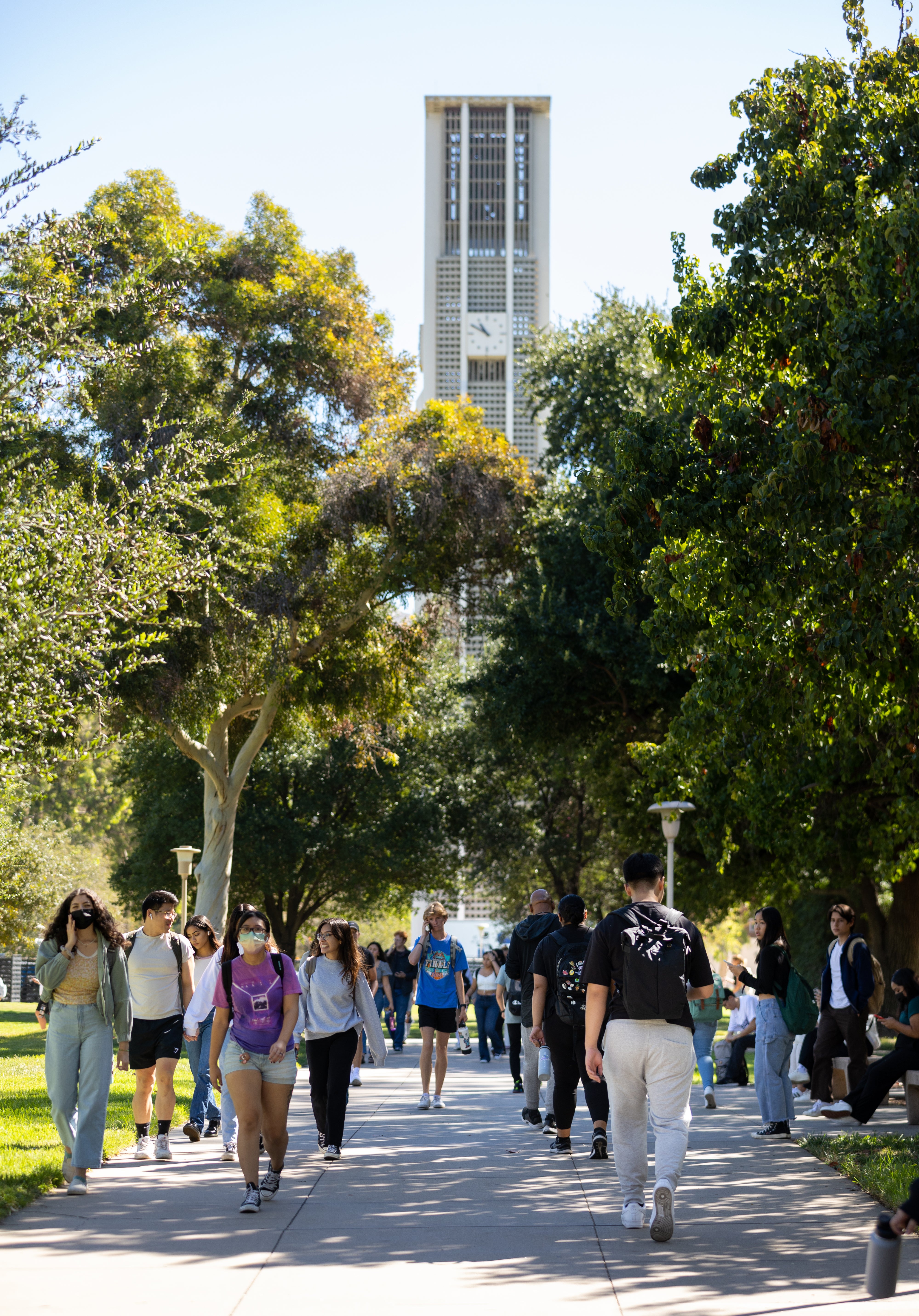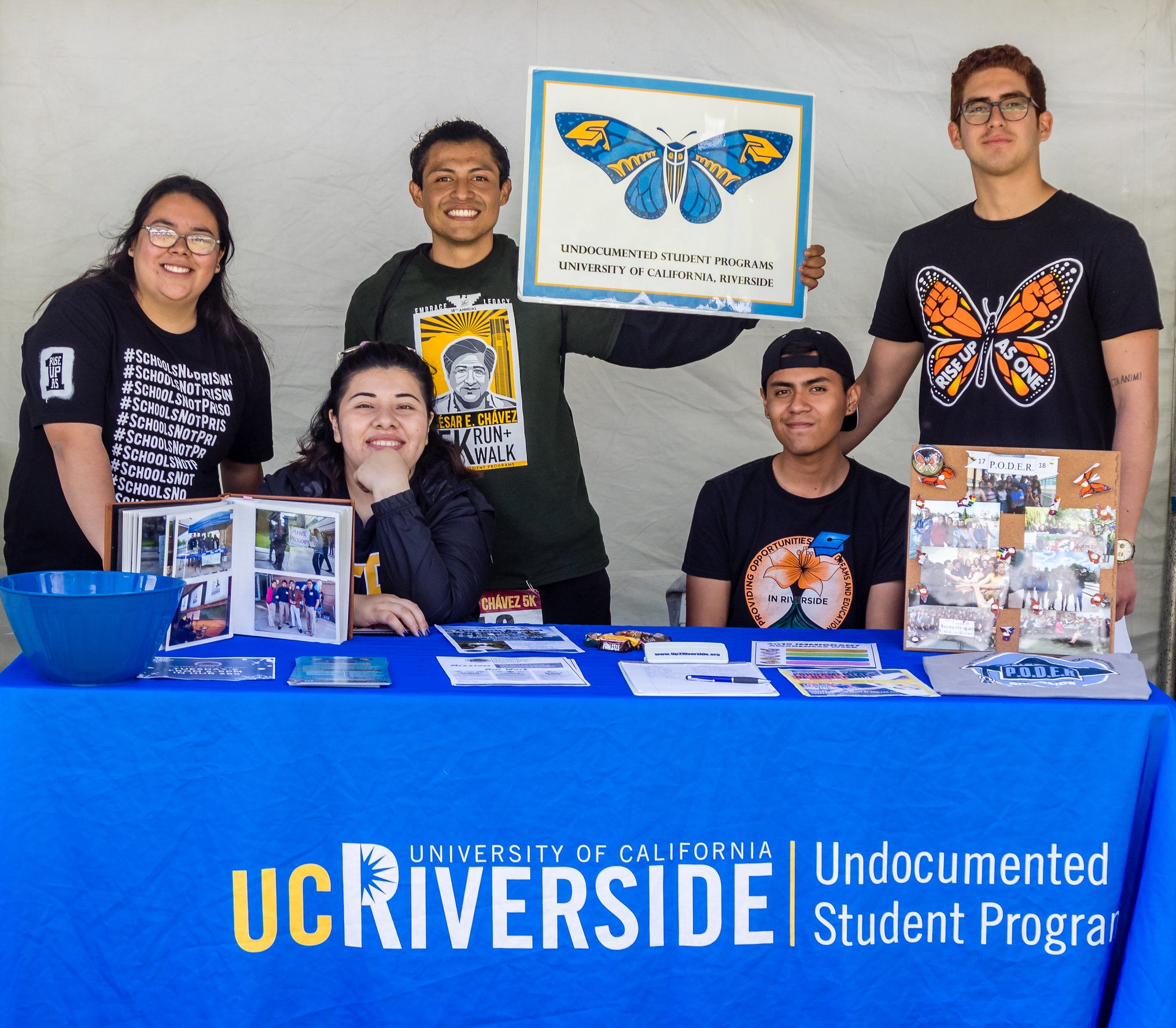Supporting Your Student's Life on Campus
UC Riverside is home to more than 25,000 diverse students. Our community thrives because of the unique and beautiful identities of every student. Their culture, language, location, previous education, and values all contribute to our vibrant and booming campus life. There is no singular student experience at UC Riverside, especially with the abundance of clubs, organizations, and opportunities available. While students may struggle as they transition into this new chapter and learn to navigate campus life. The pages below are provided with the hope that you might gain a greater understanding of their daily campus life and direct you to the resources that can help your student succeed.
Commuter
Students that live off campus have extra scheduling considerations around travel, resources, classes, and activities that all contribute to feeling disconnected from the campus or feeling overlooked for their specific needs. Commuter students who fill in their time in between class with meeting with professors and studying with peers, eating on campus, going to the gym, or joining one (or more) of our 500 student organizations–to name a few–will form a connection to the campus and engage purposefully with the Highlander community. Commuter students living at home with family will also have to learn the art of negotiating family responsibilities to get involved at and make the best of their college experience.
Here are some tips for your student:
-
Open to see the Tips
- Understand that college will be different from high school, and previous family responsibilities and/or expectations of your student will have to be negotiated.
- Spend time on campus doing a variety of things (other than going to class) to connect with the campus. Check out Highlander Link to learn about what options are of interest.
- Learn about the services available to commuter students to find out what's best for you.
- Study abroad! It’s a great opportunity to leave home and explore academic and social interests in an international setting.
- Work on-campus. Check out the Career Center for more information.
- Get involved as a family member whether your student lives at home or on campus. Reach out to the Director of Family Engagement and join the Highlander Family Network .
First Generation
With over 17,500 first-generation students admitted to UC Riverside in 2022, we lead the UC system with first-generation admissions. Nationally, first-generation students have reached 51% in college attendance (Pascarella, Pierson, Wolniak, & Terenzini, 2004; Ward, Siegel & Davenport, 2012) and are overrepresented among BIPOC communities. First-generation students–the first to go to college among their parents– tend to lean on their families for emotional support to further explore personal identities and for other types of guidance. It is extremely important that first-generation students connect with a community that will support their overall endeavors at UC Riverside. Costo Hall houses resources for all our diverse communities.
Here are some tips for your student:
-
Open to see the Tips
- Meet and connect early with professors and regularly visit them during office hours.
- Visit Costo Hall – our hub for African Student Programs, Asian Pacific Student Programs, Chicano Student Programs, LGBT Resource Center, Native American Student Programs, Middle Eastern Student Center, Undocumented Student Programs, and the Women’s Resource Center.
- If your student is eligible for housing, consider living in one of our 10 options .
- If your student is living on campus, have them consider applying for a fellow First Gen mentor.
- Learn about various academic supports at the Academic Resource Center (ARC) where we offer programs like tutoring, supplemental instruction, success workshop series, wellness coaching, writing and reading supports, mathematics support, and support for our first generation and transfer students.
- Get involved, meet people, seek a mentor, and become a mentor to another first-generation student.
- Study abroad for a quarter! This is the opportunity of a lifetime to get beyond our borders.
Former Foster Youth
Though many foster youths aspire to earn a degree, the National Foster Youth Institute found that only about 3-4% of former foster youths obtain a 4-year degree. Once enrolled, many former foster youths must navigate many obstacles – from living expenses to housing, from access to technology to the complexities of the academic world. The Guardian Scholars Program at UC Riverside supports former foster youths. All former foster youths are invited to participate in the Guardian Scholars program, which offers access to priority registration and housing, weekly community-building activities, and financial awards for basic living expenses, educational, and emergency needs.
Here are some tips for your student:
-
Open to see the Tips
- Check out the Guardian Scholars for information on scholarships, priority enrolment in classes, academic advising, tutoring, personal counseling, community activities, and more.
- Connect with someone in the University Writing Program[https://uwp.ucr.edu/wafya] who is dedicated to building collaborative academic relations with former foster youth.
- Learn about career opportunities by signing into UCR Handshake through the Career Center[https://careers.ucr.edu].
- Check out one (or more) of our over 500 student organizationsand become a member, befriend classmates, and form study groups. This is especially important for first-year commuter students.
- Go to a Highlander game! Soccer starts early in the Fall quarter, so there’s always plenty of games to get to! Remember, students get in free!
Gen Z
Generation Z are people born between 1995–2010. Gen Z is the most diverse generation in modern American history, and its members are attentive to inclusion across race, ethnicity, sexual orientation, and gender identity (Chronicle of Higher Education). Gen Z is also less likely to trust in authority figures for information, especially in the era of Google and fake news. Thus, professors and mentors are more likely to act as facilitators or connectors for them, helping them access the information and why it might be relevant to them (Megan Gerhardt, 2022).
Here are some tips for your student:
-
Open to see the Tips
- Find opportunities to connect with a variety of people by joining one of our 500 student organizations .
- Go to a Highlander game ! Soccer starts early in the Fall quarter, so there’s always plenty of games to get to! Remember, students get in free!
- Take advantage of scheduling office hours with your faculty to get to know them.
- Meet with the Career Center to plan out your years at UC Riverside.
- Learn about financial literacy with our UCR Financial Wellness Program .
International
With 2,200+ students representing over 83 countries, UC Riverside has a thriving international community. International students bring special value to UC Riverside in many ways but their transition to the UC Riverside and the U.S. can be challenging. They will undergo a culture shock in many areas of their being (i.e., language, food, traditions, academic, social, living/personal habits, and more) while thousands of miles away from their family. For many, our Fall Orientation is the international student’s first time on campus, or even in the country. Social integration and academic adjustments are often struggles international students face (Tsai, 2015). It is crucial that international students consistently use the International Center (and other resources) to get help with these initial transitions. The International Students and Scholars office supports and promotes the success, wellness, and personal growth of the international students and scholars through expert advising, intercultural programming, and advocacy.
Here are some tips for your student:
-
Open to see the Tips
- Get to know the International Center to get answers to your questions and concerns.
- With your student, review the Getting Ready page provided by the International Center. It provides you with a Pre-Arrival Checklist, and FAQs.
- Attend the mandatory orientation for international families that happen every 2nd and last Wednesday of the month from 8:30-10 a.m. PST. Reach out to the International Affairs office to sign up!
- Plan months ahead for travel and university holidays. Visa processes can be lengthy and university resources/accommodations are limited during closures and breaks. Check out our Visa FAQ page.
- Visit the ARC’s Writing Center for help to write papers or for independent projects.
- Find opportunities to connect with a variety of people by joining one of our 500 student organizations[https://studentlife.ucr.edu/student-organization-list].
- Consider reviewing the housing available to interact with international and U.S. domestic students.
LGBTQIAA+
The LGBT community is inclusive of not only undergraduate students, but also graduate students, staff, and faculty. The LGBT Resource Center , along with other community resource centers “provide support, education, and advocacy regarding sexual orientation and gender identity/expression for the UC Riverside community and beyond.” Undergraduate and graduate students, staff and faculty identifying as lesbian, gay, bisexual or transgender and allies of the community are supported by the center to engage in healthy and productive ways at UC Riverside.
Here are some tips for your student:
-
Open to see the Tips
- Visit the LGBT Resource Centerin the Costo Hall and get familiar with supportive resources, events, and programs.
- Consider on-campus living-learning community in Gender-Inclusive Housing .
- The LGBT Resource Centeralso educates and supports allies of the community; for example, a student may identify as heterosexual while a family member identifies as LGBT.
- Check out this map that identifies our Gender Inclusive Facilities (GIF) located throughout campus.
- The LGBT Resource Center hosts the annual Lambda Celebration for graduating seniors and their families, and individuals and organizations that have made outstanding contributions to the community.
- All members of UC Riverside community can register their lived name with the institution to be used everywhere publicly, while their legal names must be kept confidential with the Registrar.
Military
UC Riverside military connected students come with various life experiences. Military connected students are often transfer students (defined as students who transferred to UC Riverside from another college), have families, and have traveled the world through military duties. With such different needs than traditional aged-college students (18-22 years old, first-time college students), military connected students will benefit from finding an on-campus community that will support their social and academic goals. The Student Veteran Resource Centeris the first place military connected students should explore. It’s where you’ll find (and give) support, camaraderie, and understanding. Drop by and take a break, access resources, study, and just visit with friends.
Here are some tips for your student:
-
Open to see the Tips
- Seek and explore the Student Veterans Resource Center (VRC) and find a community. Take advantage of the study lounge complete with computers, free printer access, blue books, and scantrons. Refuel with a free cup of coffee or snack from the fridge. Put your feet up and watch a little TV between classes.
- Operation VETS (Veteran, Employment, Transition, Success) is a career-development program designed for student veterans and service members of all majors and class levels. This nine- to 12-session program features professionals and employers from various industries leading workshops, group discussions, reflective exercises, and cohort team-building activities during the sessions.
- Take care of yourself and pursue help, if needed, from the Student Disability Resource Center (SDRC) to discuss your specific needs!
- Do you have a spouse and children? Learn more about family housing to see what’s best for you.
On Campus Students
On campus students are those who live on campus and share a residential space with other students. Students living on campus have different opportunities than commuter students in that they are positioned to get to know the campus well, exercise independence, negotiate space with roommates/suite mates, access various resources, and have greater time to intermingle with students, faculty, and staff. Nationally, colleges and universities have enhanced the on-campus living experience to contribute to the student’s overall citizenship to engage in civility with students, faculty, and staff. Residential Life/Communities include programs, student organizations, and leadership opportunities for resident students to join. Residential Life/Communities have also created specific living learning communities to meet the needs of certain student groups, to support student-allies’ learning, and to educate the campus community on promoting and engaging sensibly and responsibly with one another.
Here are some tips for your student:
-
Open to see the Tips
- Get to know, spend time, and learn from roommates. This is a great time to meet new people and view the world from a different lens.
- Get to know what opportunities are available to residents by checking out the housing and resident life organizations!
- Find opportunities to connect with a variety of people by joining one of our 500 student organizations.
- Go to a Highlander game! Soccer starts early in the Fall quarter, so there’s always plenty of games to get to! Remember, students get in free!
- Work on-campus. Check out the Career Center for more information.
- Get involved as a family member whether your student lives at home or on campus. Reach out to the Director of Family Engagement and join the Highlander Family Network .
Student-Parents
About one in five college students or 22% of all undergraduate students are parents (Cruse, Holtzman, Gault, Croom, & Polk, 2019). Research shows that 2.7 million or 70% of students raising children while in college are mothers (Cruse, et al., 2019). Many student-parents enroll in community colleges, are more likely to be students of color, tend to be older than other students when enrolled in college, and have nearly twice the student loan debt as other students. Student-parents achieve higher GPA’s than others (Cruse, et al., 2019). Lack of childcare support can be a barrier for student-parents. UC Riverside understands that student-parents have competing responsibilities. Resources are available to support student-parents on their way to the degree.
Here are some tips for your student:
-
Open to see the Tips
- Read about resources for Student-Parents [https://housing.ucr.edu/students-families]; which include, childcare solutions, basic needs, lactation rooms, child-friendly study areas, financial aid resources, family housing, family activities, pregnancy resources, priority enrollment program for undergrads, and more.
- Get more information about what housing is available for you and your family [https://housing.ucr.edu/students-families].
- Get to know the professionals at your college; Student Affairs, Academic Advising, Residence Life, and learn ways to be involved with your college.
- Find opportunities to connect with a variety of people by joining one of our 500 student organizations [https://studentlife.ucr.edu/student-organization-list].
- Get involved with our Women’s Resource Center and find out more about R’Kids [https://wrc.ucr.edu/programs/r-kids].
- Review this resource [https://hr.ucr.edu/employee-resources/lactation-accommodation-program] for available lactation rooms on campus.
- Take your family to a Highlander game [https://gohighlanders.com/index.aspx]! Soccer starts early in the Fall quarter, so there’s always plenty of games to get to! Remember, students get in free!
Learn about transportation and commuting options best suited for your needs and your schedule. [https://transportation.ucr.edu/]
Students of Color
Students of color are students who self-identify as African American, Mexican American, Latinx, Asian, Native American, and/or a mix of the aforementioned racial identities. On a large campus like UC Riverside, some students of color may feel like “the only” in many areas of the campus such as in the classroom, residence halls, and walking across campus. For this reason, and for many others, it is urgent that students of color feel a sense of belonging no matter where they are on campus and no matter whom they interact with. Maslow's Hierarchy of Needs identifies love and belonging as one of five basic needs every person requires to reach their full potential. Families are a source of providing this need to their student in addition to the university.
Here are some tips for your student:
-
Open to see the Tips
- Visit Costo Hall – our hub for African Student Programs, Asian Pacific Student Programs, Chicano Student Programs, LGBT Resource Center, Native American Student Programs, Middle Eastern Student Center, Undocumented Student Programs, and the Women’s Resource Center.
- Your student should connect with an organization, faculty, or staff that will support their identity.
- Find opportunities to connect with a variety of people by joining one of our 500 student organizations .
- Talk to your student about their cultural heritage and racial identity, how their identity will shape the journey through college, and how the university can support your student.
- Engage in conversations with your student about their overall transition to UC Riverside and desired outcomes for a successful college experience.
Transfer Students
There is a misconception that transfer students will adjust to UC Riverside with little to no challenges because college is not as new to them as it is to a first-time first-year student. The truth is, transfer students will experience adjustments to UC Riverside because the campus is unique and different from other colleges, and drastically different from a community college. UC Riverside operates on a 10-week quarter system as opposed to a 15-week semester system. This means that the academic quarter moves very fast. It is likely students will have a midterm within three weeks of the quarter. Typically, transfer students are halfway through the college career. For this reason, it is important to connect immediately with not only a transfer student organization but also with Career Services for internships, with professors about research opportunities, and with Study Abroad representatives to experience another country, among other interest specific to the transfer student.
Here are some tips for your student:
-
Open to see the Tips
- Learn about living on campus . There is housing for transfer students.
- Visit the Student Life department to connect with the transfer student organization and meet other transfer students undergoing a similar experience.
- Connect with Tau Sigma , a National Honor Society dedicated to transfer student excellence.
- Find opportunities to connect with a variety of people by joining one of our 500 student organizations .
- Head over to the Transfer Student Center to learn more about what is offered specifically for you!
Underground Scholars
Riverside Underground Scholars (RUS) is an academic support program for incarcerated, formerly incarcerated, and system-impacted students. In addition, it creates a pathway for incarcerated, formerly incarcerated, and system-impacted individuals into higher education by building a prison-to-school pipeline through recruitment, retention, and advocacy. Learn more about this prison to school pipeline by clicking reviewing their website.
Here are some tips for your student:
-
Open to see the Tips
- All members of UC Riverside community can register their lived name with the institution to be used everywhere publicly, while their legal names must be kept confidential with the Registrar.
- Find opportunities to connect with a variety of people by joining one of our 500 student organizations.
- Work on-campus. Check out the Career Center for more information.
- Go to a Highlander game ! Soccer starts early in the Fall quarter, so there’s always plenty of games to get to! Remember, students get in free!
- Take advantage of scheduling office hours with your faculty to get to know them.
- Meet with the Career Center to plan out your years at UC Riverside.
- Learn about financial literacy with our UCR Financial Wellness Program.
Undocumented Students
An estimated 65,000 undocumented students graduate from the nation’s high schools per year. In California, 25,000 graduated from high school, with fewer than 7,000 going on to a community college and even less going on to the UC and CSU system (Perez, W., 2009, p. xxv; Perez, Z. J., 2014; www.naspa.org). Undocumented students are consumed with emotions that cannot be shared to just anyone on campus. Inclusive of those emotions, are students’ pre-arrival experience rooted in family advice that firmly shape their experience at the university. Undocumented students are urged to connect immediately with the Undocumented Student Services Center.
Here are some tips for your student:
-
Open to see the Tips
- Connect with and visit the Undocumented Student Programs [https://usp.ucr.edu/] in Costo Hall.
- Look into the availability of internships and fellowships [https://usp.ucr.edu/internships-and-fellowships] through Undocumented Student Programs.
- Sign up for the Poder Conference [https://usp.ucr.edu/poder-conference], held annually.
- Always ask questions to learn about eligibility for work on campus, financial aid, and study abroad.
- Identify staff [https://usp.ucr.edu/appointments] or faculty who can be mentors to help you navigate the campus and be successful. It helps to enlarge a network of peer support.
- All members of UC Riverside community can register their lived name with the institution to be used everywhere publicly, while their legal names must be kept confidential with the Registrar.
- Join PODER (Providing Opportunities, Dreams, and Education in Riverside) [https://usp.ucr.edu/PODER] or one of our other 500 student organizations [https://studentlife.ucr.edu/student-organization-list].
